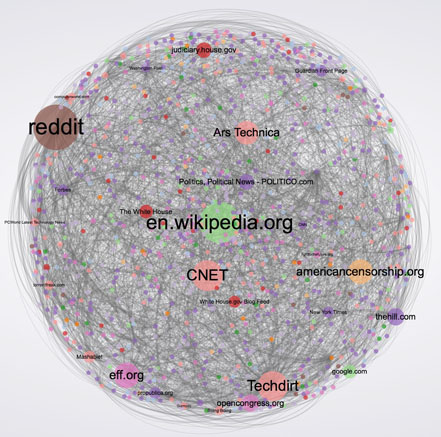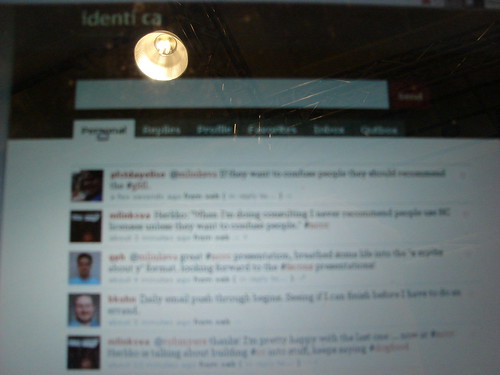My second annual thematic doubt post, expressing doubts I have about themes I blogged about during 2014.
commons ⇄ freedom, equality ⇄ good future
Same as last year, my main topic has been “protecting and promoting intellectual freedom, in particular through the mechanisms of free/open/knowledge commons movements, and in reframing information and innovation policy with freedom and equality outcomes as top.”
Rather than repeating the three doubts I expressed last year under the heading “intellectual freedom” (my evaluation of these has not much changed), I will take the subject from a different angle: the “theory of change” I have been espousing. This theory is not new to me. Essentially it is what attracted me to following the free software movement circa 1990 — its potential of extensive, pro-freedom socio-economic reform from the bottom up. That and wanting to run a unix-like on my computer — a want satisfied without respect to freedom as soon as I could use a Sun workstation at work, and for many years now would have been satisfied by OS X. I never cared very much about being able to read, modify, and share all of the software on my computer — the socio-economic implications of those capabilities make them interesting, to me. The claimed ends of the theory are in the ‘for a good future’ slogan I’ve occasionally used at least since 1998. I occasionally included the theory in blog posts (2006) and presentations (2008). Much of my ‘critical cheering’ last year (doubt) and before has largely been about my perhaps unreasonable wish that ‘free/open’ organizations and movements would take the theory I do and act as I think follows. I could easily be wrong on the theory or best actions it implies. Accordingly, I ratcheted down critical cheering in 2014; hopefully most but not all of what remained was relatively fun or novel. Instead I focused more sharply on the theory, e.g., in Sleepwalking past Freedom’s Commons, or how peer production could increase democracy, equality, freedom, and innovation, all of them!
The theory could be attacked from a number of angles — I’d love to see that done and learn of new vulnerabilities. For example, commons might not significantly affect freedom and equality, these may not be the right values, and one might consider a ‘good future’ to be one with maximum hierarchy, spectacle, even war (I repeatedly argue that future tech and culture will be marvels in most plausible futures, and that is a reason to reject ones that do not have freedom and equality as top values, but also something that makes it hard to see how a future — or present — could be different or better with more knowledge economy/policy-driven freedom and equality). But this isn’t a cheap refutation post (see below) and I don’t have very practical doubts about those values and what they imply constitutes a good future.
But I do have practical doubts about the first leg of the theory. Summary of that leg before getting to doubts: Commons-based knowledge production simultaneously destroys rents dependent on freedom infringing regimes, diminishing the constituency for those regimes, grows the constituency and policy imagination for freedom respecting regimes, and not least, directly increases freedom and equality.
Doubts:
- Effects could be too small to matter, or properly attributed to generational or other competition among firms, not commons-based production. Consider Wikipedia, a success of commons-based production if there is one. Such success may not be possible in other sectors, especially ones that command top policy attention (drugs and movies) — policy imagination has not been increased. The traditional encyclopedia industry was already mostly destroyed by Microsoft Encarta when Wikipedia came along. The encyclopedia industry was not a significant constituency for freedom infringing regimes, so its destruction matters not for future policy. Encyclopedias were readily accessible at libraries, vastly more useful info of the sort found in encyclopedias is accessible online now, excluding Wikipedia, and ‘freedoms’ to modify and distribute are just not relevant nearly all humans.
- I claim that the best knowledge policy reform is that which favors commons and that the reforms traditionally proposed by copyright and patent reformers are relatively futile because such proposals if implemented would not significantly change the knowledge economy to produce freedom and equality nor grow the constituencies for such changes — rather they are just about who, how, and for how much the outputs of production under freedom infringing regimes may be used — so-called balance, not the tilt I demand. But perhaps the usual set of reform proposals is the best that can be hoped for, especially given decades of discourse and organization-building around those proposals, and almost none about commons-favoring reform. Further, perhaps the usual set of reform proposals is best without qualification — commons-based production is a culturally marginal (in software; wholly irrelevant in most other sectors) arrangement that ought be totally ignored by policy.
- Various (sometimes semi-) free/open movements within various sectors (e.g., software, education, research publication) are having some policy successes, without (as far as I know) usually considering themselves to be as or more central to shaping knowledge policy as usual things fitting under ‘copyright reform’ and ‘patent reform’ but this could be just what needs to happen. The important thing is that commons-based knowledge production entities act to further their interests with minimal distance from current policy discourse, not that they have any distracting and possibly discrediting theory about doing so relative to overall knowledge policy.
Only the first of these gives me serious pause, though my discounting the last two might be a matter of (dis)taste — my feeling is that most of the people involved thoroughly identify with the trivia of copyright, patent, and similar law, even if they think those laws need serious reform, and act as if commons-based production is something to be protected from reform in the bad direction, but not at all central. Sadly if my feeling is accurate, the second and third doubts probably ought give me more pause than they do.
Despite these doubts, the potential huge win-win (freedom and equality, without conflict) of reorienting the knowledge economy and policy around commons-based production makes robust discourse (at the least) on this possibility urgent, even if tilt probability is low. One of the things that makes me favor this approach is that reform can be very incremental — indeed, it is by far the most feasible reform of any proposed — we just need a lot more of it. Push-roll towards tilt!
The most damning observation is perhaps that I’m only talking, and mostly on this very blog. I should change my ways, but again, this is not a cheap refutation post.
Software Freedom/Futurism/Science Fantasy
I recently wrote that “it’s much easier to take software freedom as a serious issue of top importance if one has a ‘futurist’ bent. This will also figure in a forthcoming post from me casting doubt on everything in this post and the rest from 2014.”
How important are computers to human arrangements, and how large is the range of plausible computer-involved arrangements, and how much can those realized be changed? Should anyone besides programmers and enthusiasts care about software specifically, any more or less than they care about the conditions under which any tool is created and distributed? (Contrast with other tools would be good here, but I’ll leave for another time.)
The vast majority of people seem to treat software as any other tool — they want it to work as well as possible, and to be as cheap as possible, the only difference being that their intuitions about quality and cost of software may be worse than their intuitions for the quality and cost of, for example, bridges. Arguably nearly everyone has been and perhaps still is correct.
But one doesn’t need to be much of a futurist to see software getting much more important — organizations good at using software ‘eating’ the lunches of those less good at using software, software embedded in everything or designing everything (and anything else being obsolete), regulating and mediating every sort of arrangement — with lots of plausible variation as to how this happens.
Now the doubt: does future-motivated interest in software freedom share more with interest in science fiction (i.e., moralistic fantasy) or with interest in future studies and the many parts of various social sciences that aim to improve systems going forward in addition to understanding current and past ones? If the latter, why is software freedom ignored by all of these fields? Possibly most people who do think software is becoming very important are not convinced that software freedom is an important dimension to consider. If so (I would love to see some kind of a review on the matter) it would be most reasonable to follow the academic consensus (even if it is one of omission; that consensus being of software freedom not interesting or important enough to investigate) and if one cares about the ethical dimensions of software, focus instead on the ones the consensus says are important.
Two additional posts last year in which I claim software freedom is of outsized and underappreciated importance (of course I don’t usually restrict myself to only software, but consider software a large and growing part of knowledge embodying cumulative innovation, and of the knowledge economy leading to more such accumulation) and some of many from years past (2006, 2006, 2007, 2007). The first from 2006 highlights the most obvious problem with the future. I had forgotten about that post when mentioning displacement of movies by some other form as the height of culture in 2013 — one has to squint to see such displacement even beginning yet. The second isn’t about the future but is closely related: alternative history.
Uncritical Cheering
I feared that many of my posts last year were uncritical cheering (see critical cheering above and last year). Looking back at posts where I’m promoting something, I have usually included or at least hinted at some amount of criticism (e.g., 1 2). I don’t feel too bad. But know that most of the things I promote on my blog are very likely to fail or otherwise be inconsequential — if they were sufficiently mainstream and established they’d be sufficiently covered elsewhere, and I likely wouldn’t bother blogging about them.
One followup: I cheered the publication of the first formally peer-reviewed and edited Wikipedia article in Open Medicine — a journal which has since ceased publishing.
Freeway 980
I continue to blog about removing freeway 980, which cuts through the oldest parts of Oakland. Doubt: I don’t know whether full removal would be better (at least when considering feasibility) than capping the portion of 980 which is below grade. I intended to read about freeway capping, come to some informed opinion, and blog about it. I have not, but supposedly Oakland mayor Libby Schaaf has mentioned removing 980. Hopefully that will spur much more qualified people to publish analyses of various options for my reading pleasure. ConnectOakland is a website dedicated to one removal/fill scenario.
Politics
I’m satisfied enough with the doubt in my two posts about Mozilla’s leadership debacle, but I’ll note apparent tension between fostering ideological diversity and shunning people who would deny some people basic freedoms. I don’t think this one was fairly clear cut, but there are doubtless far more difficult cases in the world.
Instead of doubt, I’d like to clarify my intention with two other posts: thought experiment/provocation, serious demand.
Refutation
I fell further behind, producing no new dedicated collections of refutations of my 8+ year old posts. My very next post will be one, but as with previous such posts, the refutations will be cheap — flippant rather than drilling down on doubts I may have gained over the years. Again these observations (late, cheap) are what led me last year to initiate a thematic doubt post covering the immediately previous year. How was this one?






